 Does your dog or cat has smelly stool? Your dog or cat can have smelly stool for a large number of reasons. It can be from something as simple as a change in diet, to a more serious issue dealing with a problem in their pancreas or intestines.
Does your dog or cat has smelly stool? Your dog or cat can have smelly stool for a large number of reasons. It can be from something as simple as a change in diet, to a more serious issue dealing with a problem in their pancreas or intestines.
Possible causes of pet’s smelly stool
There are many causes for a pets’ smelly stool including: worms/parasites, bacterial/viral infection, irritable bowel syndrome, food allergy, consumption of a foreign object, Colitis (inflammation of colon), Pancreatitis (inflammation of pancreas), and malabsorption. Not all causes can be resolved with natural remedies, and your pet may require medical treatment. Before anything, please see your veterinarian if you are concerned about your pet’s bowel issues.
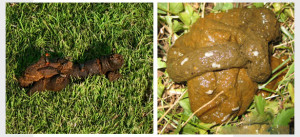
The look and smell of your pet’s poop can let you know if there is something going on. A healthy stool should be firm, with just a light smell and deep brown color. Stools that are loose and foul-smelling can indicate some sort of a health issue causing the food to spend more time in the digestive tract. You may notice he is pooping less, but once he is finally able to defecate, the smell is gut wrenching. That putrid smell is actually coming from the digestive tract in your cat or dog where the bacteria is attempting to break down the food causes the release of smelly gases such as sulfur.
The more bacteria that is needed to be broken down, means the more sulfur buildup, hence the increase in scent.
Diagnosing the cause of smelly stools
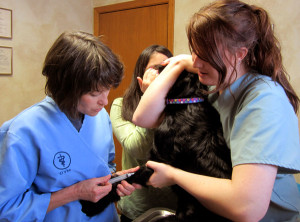 Thankfully in many cases, smelly stools in pets will last only a few days and typically resolves itself on its on. But if you have growing concerns and the symptoms are getting worse or lasting an extended period of time, a visit to your veterinarian is most likely in order. You vet will probably want to first conduct a fecal test to check for parasites. This test might have to be performed several times as parasites do not always show up in every stool sample that is collected even if your pet is infected. Your vet may also order blood tests to detect FIV, FeLV, or some sort of hormonal abnormality such as an under active or hyperactive thyroid.
Thankfully in many cases, smelly stools in pets will last only a few days and typically resolves itself on its on. But if you have growing concerns and the symptoms are getting worse or lasting an extended period of time, a visit to your veterinarian is most likely in order. You vet will probably want to first conduct a fecal test to check for parasites. This test might have to be performed several times as parasites do not always show up in every stool sample that is collected even if your pet is infected. Your vet may also order blood tests to detect FIV, FeLV, or some sort of hormonal abnormality such as an under active or hyperactive thyroid.
Vomiting that may occur along with the smelly poops can simply be due to the inflammation of the small intestine causing difficulty to keep food down, or something more serious such as a respiratory disease, heartworm infection, gallbladder disease, pancreatic disease, hyperthyroidism, heart disease, or kidney disease. So make sure you let your vet know of any other symptoms that you are aware of. Frequent hairballs is a specific form of vomiting and can be a strong sign of a delayed emptying of the stomach, and definitely another symptom to pay close attention to.
Think it’s a food-related issue?
It is often difficult to determine what food ingredient is the offending agent. The best way, and also the most tedious way, is to try an elimination diet, which is to remove one ingredient from their food for one week at a time and seeing if there is any improvement in stool.
Decreasing amount of sulfur
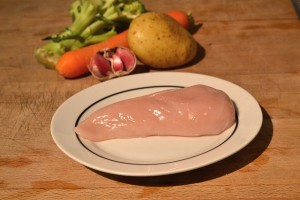 If you are certain that your pet’s diet that is the problem, you may want to upgrade the food that you are buying. A lot of the cheaper brands, found at your local grocery store, contain a lot of fillers to save cost. These fillers can be made up of meat byproducts, corn, wheat, soy and other grains which are harder on your pet’s tummy to digest, and they could also have a slight allergy towards them. The top five food allergies/sensitivities for cats and dogs are: fish, beef, dairy, corn and wheat. Make an effort to avoid these additives n your pet’s diet and try sticking to just feeding them chicken and turkey based foods.
If you are certain that your pet’s diet that is the problem, you may want to upgrade the food that you are buying. A lot of the cheaper brands, found at your local grocery store, contain a lot of fillers to save cost. These fillers can be made up of meat byproducts, corn, wheat, soy and other grains which are harder on your pet’s tummy to digest, and they could also have a slight allergy towards them. The top five food allergies/sensitivities for cats and dogs are: fish, beef, dairy, corn and wheat. Make an effort to avoid these additives n your pet’s diet and try sticking to just feeding them chicken and turkey based foods.
Make a trip to a pet store and try to shop for a higher quality product, such as EVO, Wellness, Nature’s Variety, Blue Buffalo, and Innova. These products contain less filler and are often are labeled, “grain-free”, “corn-free”, “wheat-free”, “soy-free” and is an extra bonus if it says, “contains no by-products, artificial ingredients, or preservatives”. A good trick is to look at the first 5 ingredients listed on the package as they are always listed by percentage from highest to lowest – giving you a pretty good idea about the product’s true quality.
Think about it, the less ‘stuff’ your pet needs to digest, the less bacteria is needed, hence the least amount of gas will be produced.
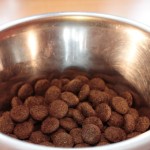 If it is not the actual ingredients that’s the problem, it could be the brand. Both dog food and cat food brands vary in the amount of protein they contain. Your pet’s stomach might only be able to handle a certain level of protein, or perhaps you recently switched brands and they are not used to having so much protein and their body needs time to adjust. The important thing to know is that once you find a brand that works, stick to it. It is necessary to keep switching brands and can often times do more damage than good for their stomachs. If you wish to provide more variety in your pet’s diet, make sure to seek out a brand that has a large variety of flavors, but still maintains similar ingredients and protein levels.
If it is not the actual ingredients that’s the problem, it could be the brand. Both dog food and cat food brands vary in the amount of protein they contain. Your pet’s stomach might only be able to handle a certain level of protein, or perhaps you recently switched brands and they are not used to having so much protein and their body needs time to adjust. The important thing to know is that once you find a brand that works, stick to it. It is necessary to keep switching brands and can often times do more damage than good for their stomachs. If you wish to provide more variety in your pet’s diet, make sure to seek out a brand that has a large variety of flavors, but still maintains similar ingredients and protein levels.
Same goes for treats
 As much as you may love to spoil your pet, you need to be strict and not offer them scraps from the table as well as any human junk food such as crackers, chips and cookies. Not only will these cause a smellier stool, but can be hazardous to your pet’s health. There are healthy treats you can share with your kitty and pup including many fruits and vegetables. Make sure to read up on what human foods your dog and cat can eat as there are certain foods that are harmless to us humans but toxic for them.
As much as you may love to spoil your pet, you need to be strict and not offer them scraps from the table as well as any human junk food such as crackers, chips and cookies. Not only will these cause a smellier stool, but can be hazardous to your pet’s health. There are healthy treats you can share with your kitty and pup including many fruits and vegetables. Make sure to read up on what human foods your dog and cat can eat as there are certain foods that are harmless to us humans but toxic for them.
Think parasites or a bacterial infection could be the source?
Unfortunately, there are many pathogens that your pets are potentially exposed to on a daily basis and not all can be avoided with a vaccine. E.coli or Salmonella are just two example of viruses that can cause inflammation in the intestines and result in diarrhea and gas that can be quite foul smelling.
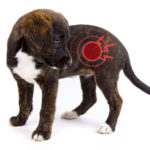 Giardia is a very common and contagious parasite that can infect cats, dogs, and even humans. When giardia is ingested, the organism travels down to the small intestine, attaches itself to the intestinal wall, damages it, and feeds on the host’s body while robbing them of much of its nutrients. This can cause a great deal of stomach upset and diarrhea displaying very loose, and pungent stool.
Giardia is a very common and contagious parasite that can infect cats, dogs, and even humans. When giardia is ingested, the organism travels down to the small intestine, attaches itself to the intestinal wall, damages it, and feeds on the host’s body while robbing them of much of its nutrients. This can cause a great deal of stomach upset and diarrhea displaying very loose, and pungent stool.
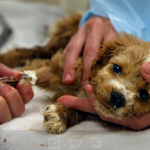 Parvovirus (Parvo) is a highly contagious viral disease that occurs in dogs, and when left untreated, can develop into a very deadly illness. The diarrhea that appears will not only be smelly, but can be bloody as well. Your dog can quickly become lethargic and dehydrated from loss of fluids. Luckily there is a vaccine that exists, but is most effective when administered at a very young age.
Parvovirus (Parvo) is a highly contagious viral disease that occurs in dogs, and when left untreated, can develop into a very deadly illness. The diarrhea that appears will not only be smelly, but can be bloody as well. Your dog can quickly become lethargic and dehydrated from loss of fluids. Luckily there is a vaccine that exists, but is most effective when administered at a very young age.
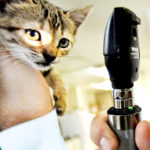 Feline parvovirus, although not the exact same illness as the one in canines, can be just as dangerous and carries a high mortality rate, especially in young kittens. When infected, the cat will quickly come down with gastroenteritis (inflammation of the stomach and intestines) accompanied by acute onset hemorrhagic vomiting and diarrhea, which can cause severe damaging to the inner lining of the intestines.
Feline parvovirus, although not the exact same illness as the one in canines, can be just as dangerous and carries a high mortality rate, especially in young kittens. When infected, the cat will quickly come down with gastroenteritis (inflammation of the stomach and intestines) accompanied by acute onset hemorrhagic vomiting and diarrhea, which can cause severe damaging to the inner lining of the intestines.
These are just a few alarming illnesses that can be the inner source of your pet’s intestinal problem, proving that your pet’s smelly stool should always be taken seriously. Unlike humans, dogs and cats can’t tell us us how bad their stomach is hurting and what they think is wrong, so it is up to us and proper medical professionals to investigate.
Temporary Remedies for your pet’s smelly poop:
- Bismuth Subsalicylate –(also known as Pepto Bismol) – *ONLY FOR DOGS* When using the liquid form, the advised dosage is 0.5-1ml of Pepto Bismol per pound of weight. It should be administered every 6-8 hours. If you’re using the tablets, that is equal to ¼ tablet per 20 pounds of weight every 6-8 hours. You should see fast results for resolving diarrhea, but do not administer long term if it seems to not be working.
- Canned Pumpkin – is a very simple and safe fiber that can be given to both dogs and cats to help regulate water in the colon. A much lesser serving should be given to cats of about 1 tbsp per meal 2-3 times a day.
- Cooked Chicken & Rice – can be a good meal to serve your cat or dog while they’re recovering from a stomach-related issue as it contains very simple ingredients and is easy on the digestive system. You would only want to serve this for a few days as it’s missing loads of vitamins and minerals that your pets require to maintain healthy bodily functions.
*Of course consult your veterinarian before trying any of these methods on your pets. These remedies are only labeled as “temporary” as that might improve the quality of your pet’s stool, but will not cure any underlying medical issue that might exist.
Do probiotics work on pets?
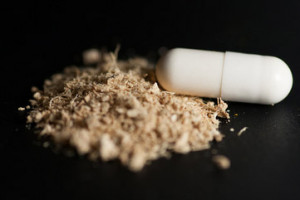 There are many studies showing the high effectiveness of probiotics on both humans and pets as they can send healthy bacteria through the intestinal tract, counteracting much of the ‘bad’ bacteria that already exists there. Veterinarians often recommend probiotics in addition to serving high quality food when confronted with diarrhea and smelly stool. Many can be purchased over the counter or at your local pet store or searched for online. They usually come in a powdered form that can be sprinkled into your pet’s wet or dried food, or in a pill form that can be slipped into one of their treats.
There are many studies showing the high effectiveness of probiotics on both humans and pets as they can send healthy bacteria through the intestinal tract, counteracting much of the ‘bad’ bacteria that already exists there. Veterinarians often recommend probiotics in addition to serving high quality food when confronted with diarrhea and smelly stool. Many can be purchased over the counter or at your local pet store or searched for online. They usually come in a powdered form that can be sprinkled into your pet’s wet or dried food, or in a pill form that can be slipped into one of their treats.
The thing to keep in mind is that not all probiotics are equal. Probiotics are often marketed as being one in the same and the general misunderstanding is that as long as a food or supplement is enriched with probiotics, it will help with the digestion process – unfortunately, this is not the case. Different probiotics have different strains and concentrations of bacteria that have different properties, and only a minority of them have been tested properly in clinical trials to find if they were indeed effective.
For example, the two popular bacterias – Lactobacillus bulgaricus and Streptococcus thermophilus (most commonly found in yogurt) – are actually unable to pass through the gastrointestinal tract intact, and a large part of them are are destroyed due to the acidity of the stomach, so not much actually reaches the colon and, therefore, provides little benefit. Make sure you do lots of research before choosing the right probiotic and, of course, please consult your veterinarian before pursuing any of these remedies.
Helpful links
- Rated dog food brands and ingredients listings (from dogfoodadvisor.com)
- Rated cat food brands and ingredients listings (from petfoodratings.org)
- List of fruits and vegeatables you can feed your dog (from Pet360.com)

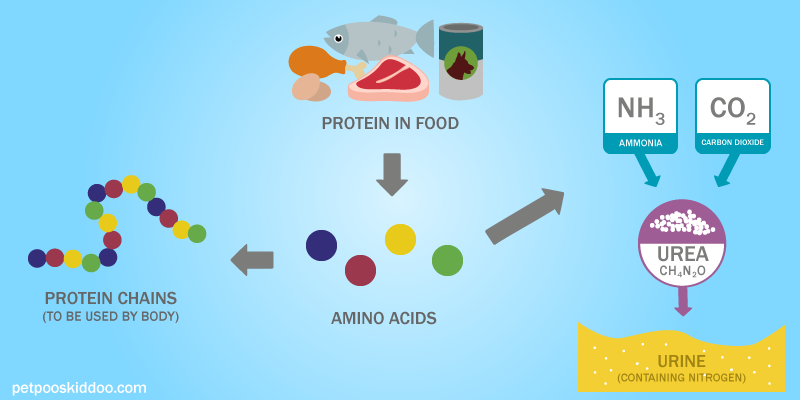 Can you (and should you) alter the nitrogen and pH in your dog’s pee?
Can you (and should you) alter the nitrogen and pH in your dog’s pee? Treatments for Your Aging Dog’s Weakened Bladder
Treatments for Your Aging Dog’s Weakened Bladder What your dog’s poop can tell you about his health
What your dog’s poop can tell you about his health